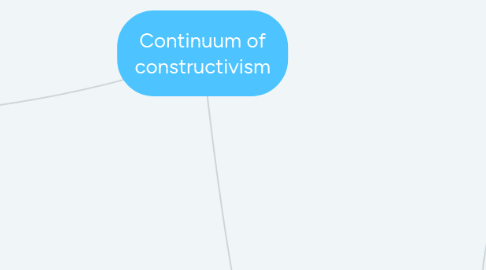
1. Paradigm
1.1. radical
1.1.1. rendering an experientially based mind
1.1.2. not mind reflects on some external reality
1.1.3. recognizing social interactions as a source of knowledge
1.1.4. internal knowledge does not match external reality
1.1.4.1. more to experience
1.1.4.2. context within which an activity was experienced
1.1.4.3. improving knowledge means improving its fit in
1.1.5. knowledge is knowledge of the owner
1.1.6. knowledge is not related to external world
1.2. cognitive
1.2.1. extreme constructivist continuum
1.2.2. information processing
1.2.3. epistemological tenets
1.2.3.1. knowledge acquisition is an adaptive process
1.2.3.1.1. principles
1.2.3.2. results from active cognizing by the individual learner
1.3. social
1.3.1. lies somewhere between knowable cognitive and personal radical
1.3.2. social nature of knowledge
1.3.2.1. result of social interaction and language use
1.3.2.2. more to shared knowledge than individual experience
1.3.2.3. knowledge bound to a specific time and place
1.3.3. social interaction occurs within socio-cultural context
1.3.3.1. emphasis social activity
1.3.4. truth is not to be found inside the head of an individual person
1.3.4.1. truth is born between people collectively searching while in dialogue interaction
1.3.5. is not objective reality of cognitive constructivism
1.3.6. is not experiential reality of radical constructivism
1.3.7. it is socially constructed and agreed upon truth resulting from coparticipation in cultural practices
1.3.8. seen mental construction knowledge as relatively trivial
2. Implications
2.1. Teaching and learning chemistry
2.1.1. students describe their own understanding
2.1.2. students restructure their own understanding
2.1.2.1. students and teachers exchange and clarify understandings
2.1.2.2. students exposed to conflict situations through discrepant events
2.1.2.3. students construct new understanding
2.1.3. students apply new understanding
2.1.4. students compare new understanding with previous understandings
2.1.5. students become active learners which is important for inquiry based subjects like chemistry
2.1.6. guiding students to create their own constructs using a process of peer and teacher-facilitated learning
2.1.7. teachers engage the students in the learning process
2.1.7.1. active way of learning chemistry
2.1.7.2. increases students positive attitude towards science
2.1.8. probing of understanding via such techniques as Predict Observe Explain (POE) and the use of concept maps
2.1.8.1. eg atomic structure , chemical bonding and organic chemistry
